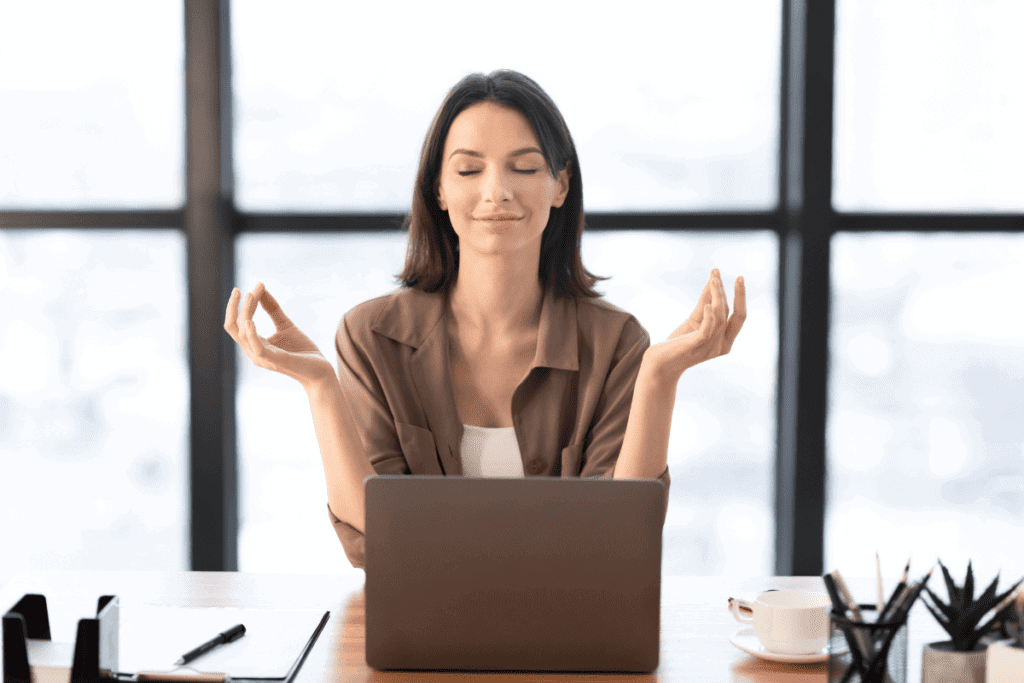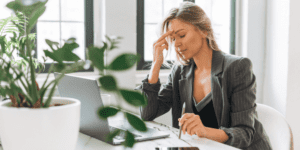Feeling overwhelmed by anxiety? You’re not alone. Millions worldwide face anxiety, more than just stress or worry. It’s a constant feeling that disrupts daily life. But, there are natural techniques to help.

By adding these techniques to your daily life, you can manage anxiety better. You don’t need medication to feel better. This article will show you effective natural methods to control your anxiety.
Understanding Anxiety and Its Impact
Starting to manage anxiety means first understanding its symptoms and effects. Anxiety is a common mental health issue that can greatly affect daily life if not managed. Recognizing the signs and understanding its impact are the first steps towards relief.
Common Symptoms of Anxiety
Anxiety shows up differently in everyone, but common signs include constant worry, fear, or unease that gets in the way of daily activities. You might feel physical symptoms like a fast heartbeat, sweating, or shaking. Mental symptoms can include feeling dread, panic, or trouble focusing.
| Symptom Type | Common Symptoms |
|---|---|
| Physical Symptoms | Rapid heartbeat, sweating, trembling |
| Mental Symptoms | Persistent worry, feelings of dread, panic |
When to Seek Professional Help
If your anxiety symptoms are severe, last a long time, or get in the way of your daily life, you need professional help. A mental health professional can offer effective coping strategies and anxiety self-help methods that fit your needs. They can help you find out why you’re anxious and create a plan to manage it.
Understanding your anxiety is the first step to managing it. By recognizing the symptoms and knowing when to seek help, you can take charge of your anxiety and enhance your life quality.
The Science Behind Natural Anxiety Management
Anxiety in the human brain is complex. Yet, natural ways to manage it offer hope. When you feel anxious, your brain starts a series of reactions to protect you. Knowing this helps you use natural methods to find relief.
How Your Brain Responds to Anxiety
When you face stress, your brain’s amygdala kicks in. It sends signals to other parts of your brain and body. This leads to the release of stress hormones like cortisol and adrenaline.
These hormones help you react to threats. But, too much of them can cause anxiety disorders. Understanding this is the first step to managing anxiety naturally.
Why Natural Approaches Can Be Effective
Natural ways to manage anxiety aim to reduce stress and promote relaxation. Practices like mindfulness meditation, deep breathing, and exercise can calm your brain. Adding these to your daily life boosts your ability to handle anxiety.
Some benefits include:
- Lowered cortisol levels
- Better emotional control
- Improved thinking skills
By knowing how your brain reacts to anxiety and using natural methods, you can manage it well. This approach not only treats symptoms but also improves your overall health.
Mindfulness and Meditation Practices
Mindfulness and meditation are great for anxiety relief. They help you stay in the moment, avoiding worries about the past or future.
Getting Started with 5-Minute Mindfulness Exercises
Start with simple exercises like focusing on your breath or feeling your feet on the ground. Just 5 minutes a day can help. Use a timer to stay on track and increase time as you get more comfortable.
Guided Meditation Techniques for Anxiety Relief
Guided meditations are great for beginners or those with high anxiety. Apps like Headspace or Calm offer sessions for anxiety. They use visualization or body scans to calm your nervous system.
“The mind is everything; what you think, you become.” – Buddha
Creating a Sustainable Daily Meditation Practice
To make meditation a habit, start small and be consistent. Find a quiet, comfy spot for daily meditation. Adding mindfulness to daily activities like eating or walking can also reduce anxiety.
| Meditation Practice | Benefits for Anxiety |
|---|---|
| Mindfulness Meditation | Reduces rumination and increases self-awareness |
| Guided Meditation | Provides a structured approach for beginners and anxiety relief |
| Daily Meditation Habit | Enhances resilience to stress and anxiety over time |
Breathing Techniques to Calm Your Nervous System
When anxiety hits, one of the simplest ways to calm down is through conscious breathing. By focusing on your breath, you can change your body’s stress response to relaxation. This section will look at different breathing techniques to help you manage anxiety without medication.

Box Breathing Method for Acute Anxiety
The box breathing method is used by athletes and military to stay calm. It involves breathing in for 4 counts, holding for 4 counts, exhaling for 4 counts, and holding again for 4 counts. This creates a “box” shape with your breath, promoting balance and calmness. By practicing box breathing, you can reduce acute anxiety and improve focus.
4-7-8 Breathing Technique for Sleep Anxiety
The 4-7-8 breathing technique, also known as the “Relaxation Breath,” helps with sleep anxiety. To practice, breathe in through your nose for 4 counts, hold for 7 counts, and exhale through your mouth for 8 counts. This technique can slow down your heart rate and promote relaxation, making it easier to fall asleep.
Diaphragmatic Breathing for Immediate Stress Relief
Diaphragmatic breathing engages your diaphragm, the muscle between your chest and belly. Place one hand on your belly and the other on your chest to check if your diaphragm is working. Inhale deeply through your nose, letting your belly rise while your chest stays still. This type of breathing can give you immediate stress relief and calm your nervous system.
Physical Exercise as an Anxiety Reducer
Exercise is more than just for your body; it’s a great way to calm your mind and reduce anxiety. Adding physical activity to your daily routine can help. It uses your body’s natural response to exercise to soothe your mind and lessen anxiety symptoms.
How Exercise Affects Brain Chemistry and Anxiety Levels
Exercise makes your body release endorphins, known as “feel-good” hormones. These hormones are key in boosting your mood and lowering anxiety. Regular exercise also changes how your brain handles stress, making it less likely to react to anxiety triggers. As Dr. John Ratey notes, “Exercise is a powerful tool for building brain resilience.”
“Exercise is a powerful tool for building brain resilience.”
Dr. John Ratey
Best Types of Exercise for Anxiety Management
Many exercises can help with anxiety, like running or cycling, which release lots of endorphins. Yoga and tai chi are also good, as they mix physical movement with mindfulness to help with anxiety. Even simple walks can be a great first step for beginners.
Creating an Exercise Routine You’ll Stick With
To make exercise a regular part of managing your anxiety, pick activities you like and can fit into your day. Start with small goals and slowly increase the intensity and length of your workouts. Sticking to it is crucial to see the benefits of exercise in reducing anxiety.
- Schedule exercise into your daily planner
- Find a workout buddy for motivation
- Mix up your routine to avoid boredom
Nutrition and Dietary Changes to Manage Anxiety Without Medication
What you eat can either make anxiety worse or better. This makes nutrition very important for your mental health. By choosing the right foods, you can manage anxiety without medication.
Foods and Beverages That May Trigger Anxiety
Some foods and drinks can make anxiety symptoms worse. These include:
- Caffeine, which can increase heart rate and jitteriness
- Sugary foods and drinks that cause blood sugar spikes and crashes
- Processed foods containing artificial additives and preservatives
Knowing these triggers can help you make better food choices.
Anxiety-Reducing Foods and Meal Planning
Eating foods that help reduce anxiety is good. These include:
- Complex carbohydrates like whole grains
- Fatty fish rich in omega-3 fatty acids
- Nuts and seeds high in magnesium and healthy fats
Planning meals with these foods can help keep your mood stable and reduce anxiety.
Hydration and Blood Sugar Management for Anxiety Control
Staying hydrated and managing blood sugar are key for controlling anxiety. Dehydration can make anxiety symptoms worse. Fluctuations in blood sugar can also cause irritability and mood swings. Drinking lots of water and eating regular, balanced meals can help keep you hydrated and maintain stable blood sugar levels.
Herbal Remedies and Natural Supplements
Many people look for ways to manage anxiety without medication. They turn to herbal supplements and natural remedies. These options are popular because they might help with anxiety symptoms with fewer side effects than regular meds.
Evidence-Based Herbal Options for Anxiety Relief
Some herbal remedies have shown to help with anxiety. Passionflower and Lavender are two examples. Passionflower helps by increasing GABA in the brain, which promotes calmness. Lavender, when taken as tea or a supplement, can lower cortisol levels, helping to calm the mind.
Safe Usage Guidelines and Potential Interactions
It’s important to use herbal remedies wisely. Always talk to a healthcare professional before starting any new supplements, especially if you’re on medication. Some herbal remedies can affect how well prescription drugs work or worsen health conditions. For example, St. John’s Wort can make some antidepressants less effective.
So, it’s crucial to know about possible interactions and start with small doses. This way, you can safely use herbal remedies to help manage your anxiety.
Sleep Optimization Strategies
Good sleep is key to managing anxiety. Quality sleep helps keep your mind healthy. This section will show you how to sleep better.
Creating a Sleep-Friendly Environment
Make your bedroom a cozy sleep spot. It should be dark, quiet, and just right for temperature. Use blackout curtains, earplugs, or a white noise machine if it’s not perfect.
Choose a comfy mattress and pillows. They help you relax and sleep well.

Bedtime Routines to Reduce Nighttime Anxiety
Start a calming routine before bed. This could be reading, a warm bath, or gentle stretches. Stay away from screens for at least an hour before bed.
Managing Sleep-Related Worry and Rumination
Worries can make it hard to sleep. Try mindfulness meditation, journaling, or CBT-I to help. These methods tackle the worries that keep you awake.
By using these strategies, you can sleep better and feel less anxious. Sleep is a big part of self-care for anxiety and stress management for anxiety relief. Making these changes can really improve your health.
Cognitive Behavioral Techniques You Can Practice at Home
You can lower your anxiety by using Cognitive Behavioral Techniques at home. These methods help you spot and fight negative thoughts. This leads to better control over your anxiety.
Identifying and Challenging Catastrophic Thinking
Catastrophic thinking is when you think the worst will happen. To fight this, ask yourself: “Is this thought based on facts or assumptions?” and “How likely is the worst-case scenario?” Changing these thoughts can really help reduce your anxiety.
Structured Journaling for Anxiety Management
Keeping a journal is a great way to manage anxiety. Writing down your thoughts and feelings helps you see patterns and what triggers them. Try to journal at the same time every day. Focus on: “What happened,” “How I felt,” and “What I can do differently next time.”
| Journaling Focus | Purpose |
|---|---|
| What happened | Identify triggers |
| How I felt | Recognize emotional responses |
| What I can do differently | Develop coping strategies |
Self-Directed CBT Exercises and Resources
There are many self-directed CBT exercises to help with anxiety. These include cognitive restructuring, exposure therapy, and mindfulness meditation. Use online resources, apps, and workbooks to help you. Being consistent is important for seeing better anxiety management.
By adding these Cognitive Behavioral Techniques to your daily life, you can manage anxiety without medication. This will also improve your mental health.
Lifestyle Changes for Long-Term Anxiety Management
Making some lifestyle changes can really help with anxiety. Simple steps can make a big difference in how you feel. By adding these habits to your day, you can manage anxiety better and feel happier.
Setting Boundaries and Learning to Say No
It’s important to set healthy boundaries to manage anxiety. Saying no to things that stress you out can help. Remembering your limits and focusing on what’s important to you can lead to a more balanced life.
Digital Detox and Screen Time Management
Too much screen time can make anxiety worse. Taking breaks from screens can help you feel better. Try setting times or places where screens are off, like during meals or before bed, to relax more.
Creating Routines That Reduce Background Stress
Creating routines that help you relax is a great coping strategy for anxiety. Activities like meditation, yoga, or reading can help. These anxiety self-help methods can fit into your life in ways that feel good to you.
Conclusion: Creating Your Personalized Anxiety Management Plan
Now that you’ve looked into natural ways to manage anxiety, it’s time to make a plan that fits you. Use mindfulness for anxiety reduction and relaxation techniques for anxiety to find lasting holistic anxiety relief.
Begin by picking the methods that feel right to you. Did you like the calm from breathing techniques or the stress cut from physical exercise? Maybe you found peace in mindfulness practices or meditation. Mix these to make a plan that’s just for you.
Starting this journey means being consistent and patient. Try out different methods and don’t hesitate to get help when you need it. With a holistic anxiety relief approach, you can feel better and handle life’s ups and downs more easily.
FAQ
What are some effective natural techniques for managing anxiety?
Natural ways to manage anxiety include mindfulness and meditation, breathing exercises, and physical activity. Eating right, using herbal remedies, and getting enough sleep also help. Changing your lifestyle and using cognitive behavioral techniques can make a big difference.
How can I start practicing mindfulness and meditation for anxiety relief?
Start with short mindfulness exercises, like 5-minute sessions. Try guided meditation to calm your mind. Make meditation a daily habit to reduce anxiety.
What breathing techniques can help calm my nervous system?
Box breathing, 4-7-8 breathing, and diaphragmatic breathing can calm your nervous system. These techniques help lower anxiety.
How does physical exercise impact anxiety levels?
Exercise changes your brain chemistry, reducing anxiety. It releases endorphins, or “feel-good” hormones, which boost your mood and reduce stress.
Are there specific foods that can trigger or reduce anxiety?
Yes, some foods can trigger anxiety, while others can help. Eating a balanced diet with anxiety-reducing foods, staying hydrated, and managing blood sugar can control anxiety.
Can herbal remedies and natural supplements help with anxiety relief?
Certain herbal options can help with anxiety when used safely and under guidance. But, be aware of potential interactions with other medications.
How can I optimize my sleep to reduce anxiety?
Create a sleep-friendly environment and establish bedtime routines. Manage worries about sleep to improve sleep quality and reduce anxiety.
What cognitive behavioral techniques can I practice at home to manage anxiety?
Practice identifying and challenging negative thoughts. Use structured journaling and self-directed CBT exercises to manage anxiety.
What lifestyle changes can I make for long-term anxiety management?
Set boundaries, practice digital detox, and create routines that reduce stress. These changes can lead to a more balanced life and long-term anxiety management.
How can I create a personalized anxiety management plan?
Use natural techniques like mindfulness, exercise, and cognitive behavioral techniques that work for you. Create a personalized plan for long-term anxiety relief and improved well-being.






